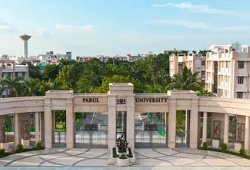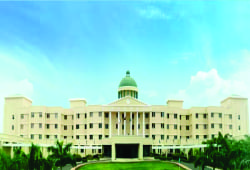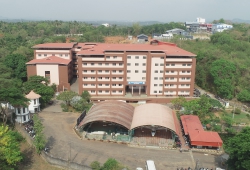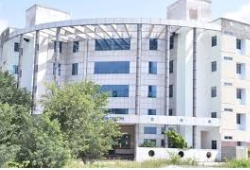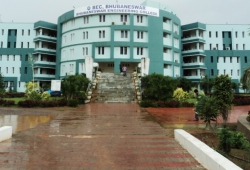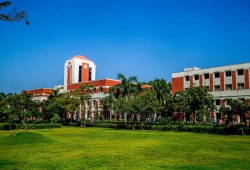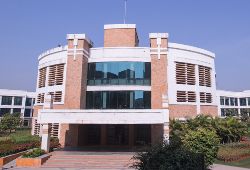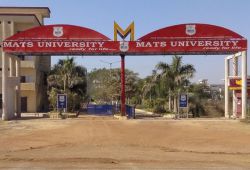
Top Aeronautical Colleges in India
Many of India's top aeronautical engineering colleges are shining examples of aviation and aerospace education spread throughout the country's enormous territory. These universities, which are dispersed throughout the nation, provide courses for those interested in aviation who want to succeed in this exciting industry. Institutions offering top-notch instruction, cutting-edge facilities, and a strong foundation for an exciting career in aeronautical engineering can be found in India's north, south, east, or west.
Aeronautical Engineering Course Fees in India
Now, let's explore the Aeronautical Engineering course fees in Top Aeronautical Colleges in India for different degree levels:
Diploma in Aeronautical Engineering
- For those who want to work in the field, diploma programs in aeronautical engineering are a great place to start because they are typically less expensive. Usually, the course lasts between one and two years. Depending on the institution, the fees can vary from INR 40,000 to INR 1,00,000.
Bachelor's Degree in Aeronautical Engineering
- A bachelor's degree is a common option for people looking for a thorough education in aeronautical engineering. Typically, a bachelor's program lasts four years. In India, course fees can range from INR 1,00,000 to INR 4,00,000 or more for respectable colleges.
Master's Degree in Aeronautical Engineering
- People who want to specialize and grow in their careers frequently enroll in Master's programs in Aeronautical Engineering. Depending on the reputation of the institution, these programs can cost anywhere from INR 1,50,000 to INR 6,00,000 and usually last for two years.
Scholarships and Financial Aid
- As previously stated, financial aid and scholarships can significantly lessen the financial burden. In India, a number of public and private institutions provide grants and scholarships to deserving students. To lower the cost of your education, it is a good idea to look into and apply for these opportunities.
Aeronautical Engineering Colleges Admission in India
Certain eligibility requirements must be fulfilled in order to gain admission to India's prestigious aeronautical institutions for those pursuing aeronautical engineering. This article explores the requirements that prospective students of aeronautical engineering must meet in order to start their careers in the aerospace sector.
- Academic Qualifications: Completing 10+2 with a solid foundation in math, chemistry, and physics is the prerequisite for eligibility. These topics form the foundation for a thorough understanding and are essential to aeronautical engineering.
- Entrance Examinations: In order to be admitted, prospective students must pass entrance exams. State-level engineering entrance exams, JEE Main, JEE Advanced, and AME CET are examples of these tests. A crucial first step in guaranteeing your spot is passing these tests.
- Minimum Aggregate Marks: Eligibility typically requires a minimum aggregate of marks, usually set at 50% or higher. This guarantees that students have the academic groundwork necessary to succeed in programs involving aeronautical engineering.
- Additional Entrance Exams:Additional entrance exams administered by the relevant college may be required by certain institutions. Prospective students need to be ready to fulfill these requirements unique to their institution.
- Age and Nationality Requirements: Certain institutions might have eligibility requirements related to nationality or age. Knowing these details is essential to making sure you fulfill all the requirements.
Aeronautical Engineering Campus Facilities in India
Modern infrastructure and facilities are essential to the field of aeronautical engineering because they give students the means to engage in practical training and conduct cutting-edge research. We'll examine the vast array of facilities available by India's leading aeronautical colleges in this section.
- Cutting-Edge Laboratories: These state-of-the-art labs have flight simulation setups, material testing facilities, and wind tunnels. They guarantee that students acquire useful skills by giving them immersive, hands-on experience with aviation technology.
- Aircraft Maintenance Hangars: Students can obtain hands-on experience in aircraft maintenance and repair in hangars on campus. Future aeronautical engineers will benefit greatly from this practical experience.
- Rich Library Resources: To assist with academic and research activities, large libraries have a vast collection of books, research papers, and internet resources. A wealth of information is available to students to support their education.
- Aviation Workshops: A vast range of tools and equipment necessary for building and modifying aircraft components are available in these workshops. For students to understand the complexities of aircraft design and maintenance, this hands-on experience is essential.
- Computer Labs: These computer labs, equipped with specialized software for engineering projects and aerodynamic simulations, give students a technologically advanced setting in which to refine their skills.
- Interactive Classrooms: Interactive learning is promoted in contemporary classrooms equipped with audio-visual aids. For students studying aeronautical engineering, they provide a dynamic and captivating learning environment.
- Research Centers: These facilities are leading the way in innovative space research. Students can work on innovative projects that push the limits of aviation innovation and technology.
- Hostel Facilities: To promote safety and a feeling of community, on-campus housing is offered. This guarantees a favorable atmosphere for learning and personal growth for students.
- Sports and Recreation: Sports fields, cultural clubs, and gyms provide students with a well-rounded and stimulating lifestyle. Recreational and physical activities support a well-rounded educational experience.
Aeronautical Engineering Admission Process in India
Admission to India's esteemed colleges of aeronautical engineering is a process with showed that the method. We'll walk you through the admissions process and explain what to expect in the sections that follow.
- Application: Prospective students initiate the process by completing the AME CET application form and submitting the requisite details. This marks the beginning of your journey toward a career in aeronautical engineering.
- Entrance Exam: Candidates participate in the AME CET examination, a rigorous evaluation of their knowledge and aptitude in aircraft maintenance engineering. Success in this exam is a significant milestone.
- Counseling: Eligible candidates are invited to participate in counseling sessions after the exam results are announced. Based on their AME CET scores and the number of seats available, they can choose their favorite colleges and courses during these sessions.
- Document Verification: Candidates must provide necessary documentation, such as identification documents, AME CET scorecards, and educational certificates, as part of the counseling process.
- Seat Allotment: Candidates are given seats by colleges according to their selections and AME CET exam results. In order to gain admission, this is an essential step.
- Fee Payment: To guarantee their spot in the selected college, admitted students must pay the necessary fees. You're one step closer to your journey in aeronautical engineering once the fees are paid.
- Reporting to College: In order to complete the admissions process and start their aeronautical engineering careers, students who have been accepted through AME CET must finally report to their respective colleges on the specified date.
Aeronautical Engineering Entrance Exam in India
Entrance exams for aeronautical engineering are essential for evaluating prospective students' aptitude, knowledge, and abilities in this fast-paced field. Numerous colleges and universities throughout India offer aeronautical engineering programs, and admission to these programs depends heavily on these standardized tests. Notably, a number of well-known entrance exams are acknowledged for their importance in obtaining admission to programs in aeronautical engineering, including:
- Joint Entrance Examination (JEE) Main: A nationally recognized entrance exam that assesses applicants' knowledge of mathematics, physics, and chemistry. JEE Main results are accepted for admission to many prestigious engineering colleges in India.
- Joint Entrance Examination (JEE) Advanced: Candidates who perform well on JEE Main move on to JEE Advanced. It acts as the entry point to esteemed establishments such as the Indian Institutes of Technology (IITs), some of which provide programs in aeronautical engineering.
- Aircraft Maintenance Engineering Common Entrance Test (AME CET): Designed to be accepted into programs in aircraft maintenance engineering, which is closely related to aeronautical engineering. Colleges all throughout India that offer these programs accept AME CET scores.
- State-Level Engineering Entrance Examinations: Individual engineering entrance exams are administered by a number of Indian states. Students can use the results of these tests to gain admission to state-specific aeronautical engineering programs.
Download Brochure for Top Aeronautical Colleges in India
To start your journey to the stars, look through the comprehensive brochure of Indian Aeronautical Engineering Colleges. This thorough guide provides useful details about the top colleges, programs, requirements, admissions procedures, and job openings in the aerospace industry. Whether your objective is to support space exploration or design cutting-edge aircraft, this brochure will help you make informed decisions about your academic path. To begin your journey toward an exciting and rewarding career in the aerospace industry, download it right now!
Specializations in Aeronautical Engineering
Because aeronautical engineering is a broad field with a variety of specializations, students can customize their education to fit their particular interests in the aerospace sector. To meet the diverse needs of the aviation and aerospace industries, the top aeronautical engineering colleges in India provide a range of specialized programs. Here, we highlight some of the main specializations that students at these esteemed universities can choose from:
- Aircraft Design and Manufacturing: This specialization explores topics like aerodynamics, structural design, materials, and manufacturing processes with an emphasis on aircraft creation. Students gain expertise in creating safe and effective aircraft designs.
- Aerospace Propulsion: This field of research focuses on aircraft engines, rockets, and propulsion systems. Students learn about propulsion principles, flight mechanics, and engine design.
- Avionics and Control Systems: Covering the electronic systems on board aircraft, including communication, navigation, and flight control. This specialization explores the technology that ensures aircraft safety and efficiency.
- Aircraft Maintenance and Repair: Concentrating on aircraft maintenance, inspection, and repair. Students become experts in guaranteeing the airworthiness and safety of aircraft, making them indispensable in the aviation industry.
- Space Technology and Exploration: This specialization explores spacecraft design, satellite technology, and space mission planning in response to the growing interest in space exploration. Students can work on projects involving interplanetary exploration, satellites, and space missions.
- Aeronautical Research and Development: This specialization highlights cutting-edge aeronautical research for those with a research bent. Students work on projects that challenge the limits of aerospace innovation and technology.
- Unmanned Aerial Vehicles (UAVs) and Drones: This specialization focuses on the design, use, and operation of unmanned aerial vehicles for tasks like data collection, delivery, and surveillance, given the widespread use of drones and UAVs in a variety of industries.
- Aerospace Management: Specifically designed for students who are curious about the business side of the aviation sector. Topics including airline management, aviation marketing, and aviation operations are covered in this specialization.
Higher Qualifications in Aeronautical Engineering
For professionals looking to progress their careers, focus on particular areas, or conduct cutting-edge research, obtaining advanced degrees can lead to a lot of opportunities of in the dynamic and constantly changing field of aeronautical engineering. Aeronautical engineers may want to consider the following additional qualifications:
- Master's in Aeronautical Engineering (M. Tech/MS): Professionals can specialize in areas such as structural design, propulsion systems, or aerodynamics with a postgraduate degree in aeronautical engineering. It's a great option for people who want to work in research or in more technical roles.
- Doctor of Philosophy (Ph.D.) in Aeronautical Engineering: A Ph.D. in aeronautical engineering is designed for people who are passionate about research and innovation and provides the chance to significantly advance the field. Careers in academia, research, or senior roles in the aerospace sector may be available to those with this qualification.
- Master of Business Administration (MBA): Having an MBA and a technical background together can lead to management and leadership positions in the aerospace sector. Business-savvy aeronautical engineers are extremely useful for managing aerospace projects and making strategic choices.
- Certifications and Licenses: Becoming a licensed aircraft maintenance engineer (AME) or earning certifications in particular software or technologies utilized in the aerospace industry are just a few of the certifications and licenses that aeronautical engineers can pursue.
- Short-Term Courses and Workshops: Industry associations and academic institutions offer short-term courses, workshops, and seminars that help people stay up to date on the most recent developments in the field.
- Specialized Master's Programs: A well-rounded education with a specific focus is provided by certain universities' specialized master's programs in fields like space technology, aviation safety, or aerospace management.
- Online Courses and Massive Open Online Courses (MOOCs): A plethora of online courses and MOOCs are available on platforms such as Coursera, edX, and Udemy, covering a wide range of aerospace-related topics. These can be a flexible and cost-effective means to acquire additional knowledge and skills.
Top Recruiters for Aeronautical Engineering Graduates
Knowing well-known employers can help you make better decisions about your future career. We highlight Indian companies that are actively looking for graduates in aeronautical engineering. Because of their proficiency in aviation and aerospace technology, Indian graduates of aeronautical engineering are highly sought after in a variety of industries. The following are some of the leading employers actively looking for graduates in aeronautical engineering:
- Indian Space Research Organization (ISRO): ISRO offers exciting career opportunities in satellite development, rocket propulsion, and space exploration projects.
- Hindustan Aeronautics Limited (HAL): HAL, a major aerospace and defense company, recruits aeronautical engineers for roles in aircraft and helicopter manufacturing.
- Defense Research and Development Organization (DRDO): Work on defense technology initiatives, such as avionics and missile development.
- Bharat Heavy Electricals Limited (BHEL): Aeronautical engineers are employed by BHEL to work on gas turbine equipment used in power generation.
- National Aeronautics Laboratory (NAL): NAL is primarily focused on aerospace research, and aeronautical engineers assist with wind tunnel testing, aerodynamic research, and aircraft design.
- Air India: To ensure flight safety, the national carrier employs aeronautical engineers to maintain and engineer aircraft.
- Private Aerospace Companies: Tata Advanced Systems, L&T, and Mahindra Aerospace offer diverse opportunities in aerospace technology and manufacturing.
- Aviation Companies: Airlines like IndiGo, SpiceJet, and Vistara hire aeronautical engineers for aircraft maintenance and safety roles.
- Research and Development Centers: Participate in cutting-edge research in educational institutions, research centers, and independent organizations.
- Consulting and Engineering Firms: Giants like Wipro, TCS, and Infosys offer engineering solutions to the aviation and aerospace industry.
Aeronautical Engineering Course Syllabus
Prospective students must comprehend the course syllabus. An outline of the usual coursework and topics taught in Indian aeronautical engineering programs is given below. The design, development, and maintenance of aircraft and spacecraft are the main focuses of the diverse and dynamic field of aeronautical engineering. Aeronautical engineering programs are offered by a number of esteemed colleges in the city of India, which serves as a significant hub for the Indian aerospace industry. This article explores the curricula of Indian colleges of aeronautical engineering, giving prospective students an idea of what to anticipate from their academic career.
First Year Courses:
- Mathematics and Applied Mathematics:
- Calculus
- Linear Algebra
- Differential Equations
- Probability and Statistics
- Physics:
- Mechanics
- Electromagnetism
- Waves and Optics
- Engineering Mechanics:
- Statics and Dynamics
- Kinematics and Kinetics
- Equilibrium of Structures
- Engineering Graphics:
- Geometrical drawing
- Projections
- Sectional views
Second Year Courses:
- Aerodynamics:
- Fundamental principles
- Compressible and incompressible flows
- Boundary layers
- Fluid Mechanics:
- Fluid properties and behavior
- Fluid statics and dynamics
- Control volume analysis
- Materials Science and Engineering:
- Properties of materials
- Material selection for aerospace applications
- Heat treatment and material testing
- Thermodynamics:
- Basic concepts
- Laws of thermodynamics
- Gas dynamics
Third Year Courses:
- Aircraft Structures:
- Structural analysis
- Stress and strain analysis
- Finite element analysis
- Aircraft Propulsion:
- Gas turbine engines
- Jet propulsion
- Propeller theory
- Aircraft Design and Manufacturing:
- Design process
- Manufacturing techniques
- Composite materials in aircraft design
- Avionics and Control Systems:
- Avionics components and systems
- Aircraft control systems
- Flight control systems
Fourth Year Courses:
- Flight Mechanics and Aircraft Performance:
- Aircraft performance parameters
- Stability and control
- Flight testing
- Aircraft Maintenance and Repair:
- Maintenance practices
- Aircraft inspection and repair
- Regulatory compliance
- Aerospace Propulsion Systems:
- Advanced propulsion systems
- Rocket propulsion
- Hybrid propulsion
- Project Work and Internships:
- Final year project
- Industry internships
Duration of Aeronautical Engineering Courses:
Typically, aeronautical engineering degree programs span four years, comprising eight semesters. During this period, students engage in a comprehensive study of fundamental engineering principles, aeronautics, and aerospace technologies, equipping them with the knowledge and skills required for a career in the aerospace industry.



